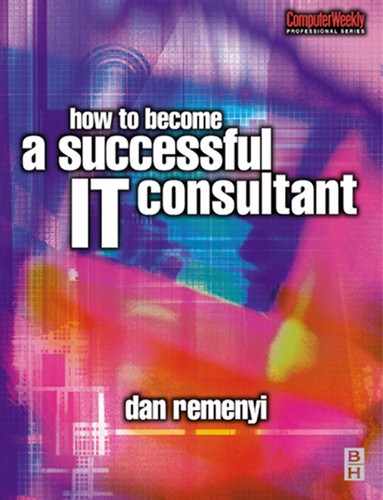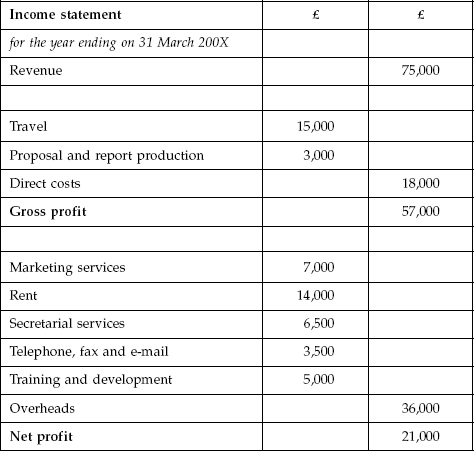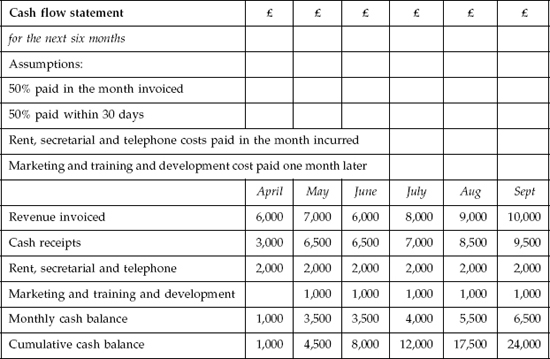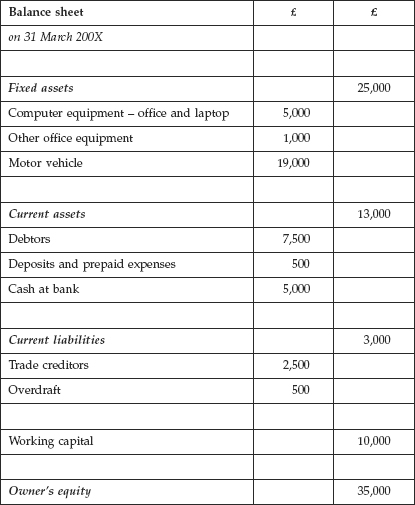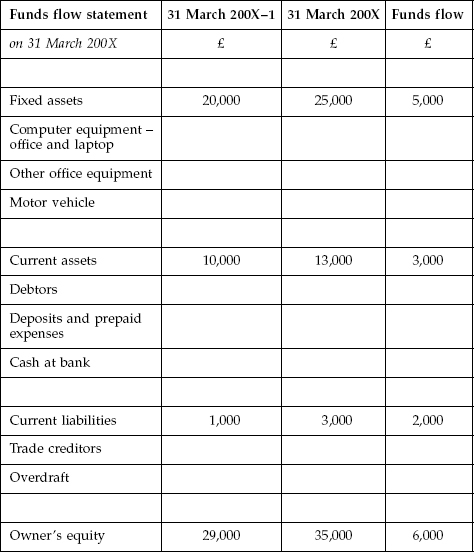Minding your own business |

Annual income twenty pounds, annual expenditure nineteen nineteen and six, result happiness. Annual income twenty pounds, annual expenditure twenty pounds ought and six, result misery.
Dickens, C., David Copperfield, spoken by Mr Micawber and first
published in 1850, p. 209: Centennial Edition, 1950.
12.1 Keeping your business going is the real challenge
It is only when you are up and running as an IT consultant that the real challenges and perhaps the real ‘fun’ begins. It might or might not be difficult to start up your IT consultancy business, but it is certainly a full-time job to keep it going. Most IT consultancies simply do not last. Failure occurs for one or more of many reasons, even after the business has been established and is up and running. As long as you want to remain an IT consultant working for yourself you will need to continuously have your eye on the ball.
There is no doubt that creating an IT consulting business is clearly a substantial feat. However, having done this the real challenge is in growing the business and keeping it going year after year. A sustainable business in the medium to long term is the real objective. To achieve this you will not only need to be an excellent IT consultant, but you will also need to have both business sense and also be well equipped with general management skills. There are in fact few businesses that are quite as demanding as running an IT consultancy1 and you will need to think carefully as to how you want to sustain and grow your business.
12.2 Remember why you started your own business
In understanding the options available to you it is useful to reflect on why you started up your IT consulting business in the first place, and what were your personal objectives. It is always important to keep these in mind because in the hustle and bustle of everyday business it is easy to lose sight of what you are trying to achieve. You may have got into this business because you were not enjoying the routine and the regimentation of the corporate world where office politics was at least as important as how well you did your work. You may have got into this business because you felt that you were not being properly remunerated for the contribution you were making to your organization. You may have got into this business because you saw that promotion was not going to come your way until your boss retired or was run over by the proverbial no. 42 bus. Not seeing a clear career path leading to an interesting and lucrative job is one of the most popular reasons for setting up one's own business. You may have got into this business because you had been fired or maybe your previous employers were polite enough to allow you to resign – maybe you made a mistake or maybe you were just too entrepreneurial for them. You may have got into this business because you mistakenly thought that by working for yourself you were going to have lashings of free time to pursue your numerous interests and hobbies.
So the way that you will sustain and grow your IT consulting business will depend on where you have come from. If you got into this business because you felt that you were not being properly remunerated or because you were just too entrepreneurial for your previous employer you will probably be keen to grow your business as fast as possible. On the other hand if it was because you felt that you were not enjoying the routine and the regimentation of the corporate world or the office politics or because you didn't see how you would be promoted under your current circumstances you may be happy to sustain a low level of business activity and not be too bothered by growth. Of course if you got into this business because you felt that you were going to have lashings of free time to pursue your numerous interests and hobbies you will probably already have made a flop of it and will have since gone back to finding a job and you will probably be as miserable in your new work as you were before. Going into business on your own, whether it is in IT consultancy or any other business activity, in order to have more free time is not likely to succeed. Starting up a new business is an extraordinarily time consuming business especially in the early years. Those who think they can create a new business without a lot of effort are in for a shock.
12.3 Money versus quality of life
If you are highly entrepreneurial you will be looking to optimize your financial return at least in the medium term, on the other hand if you are more concerned with job satisfaction your interests will not be so financially oriented, but you will want to ensure a continuous flow of work that will reward you both from an interest point of view as well as from a financial perspective. A highly entrepreneurial approach will mean that you will aim for as many clients as possible – you will take on any job for which you can vaguely claim to have competence; you will employ as many people as you need and you will be largely concerned about keeping them fully employed at as high a charge-out rate as you can. You will spend much of your time worrying about the profit and loss and the cash flow. You will want to build your own head office as soon as you can and will always be mindful of taking your company to the stock market. On the other hand, pursuing a quality of the work orientation2 will mean a much more reflective approach where you will be more selective about the work you will accept. You will not recruit many new people and you will probably obtain more hands when you need them through outsourcing or strategic alliances. Of course the profit and loss and the cash flow will still be important, but they will not be the sole or the overwhelming important driver of your business. You will probably still be working from home and enjoying not having to undertake the daily commute. The idea of a head office will be anathema and although you might sell your business if you could, and the price was right, you would never want to take it to the stock market.
If you fall into the first category – the highly entrepreneurial approach – you will be looking for a return for your efforts of hundreds or thousands or million of pounds; if you are in the second category – quality of the work approach – you will be very much more modest in your financial expectations. It is important to keep this in mind because if you are highly entrepreneurial and your IT consultancy business is not making the type of money you aim to get out of it, you have to sell the business or arrange for a management buyout or wind it up or just give it away and start up another new business, which might give you the returns you require. At the end of the day business needs to be quite unsentimental especially if you have high financial expectations. The decision is simply a question of opportunity costs. You just don't stick for too long with an investment that is not making the return you are aiming at. It is your business and you will sometimes have to make tough decisions.
When it is the quality of the work that is your primary driver you may still have to sell up or close down if your business isn't making the type of money that will sustain your operation or your lifestyle. If your revenue is very low then you will go broke and it will be obvious that you will have to close down and find a job. But sometimes the revenue earned is just barely enough to keep going, but not really enough to be giving you a satisfactory lifestyle. Under these circumstances it can be a very tough decision to quit. But you may well have to. Again it's your business and tough decisions are part of the reality of being in charge.

WHEN IT IS THE QUALITY OF THE WORK THAT IS YOUR DRIVER …
While your business is functioning and whether you are driven by the entrepreneurial urge or the quality of work and life motive, there are a number of common issues which you will have to think about and address if you intend your business to continue to exist into the medium to long term. These come under four main headings:
1 Nurturing a sustainable client relationship
2 Internal administration
3 Creating a sustainable working regime
4 Seeing new opportunities
12.4 Nurturing a sustainable client relationship
There are of course exceptions but, by and large, a considerable amount of IT consultancy tends to come in rather short-term assignments from a considerable variety of clients. Thus relationships with clients are inclined to be rather short, with the consultant no longer being required when the specific job is completed.

THUS RELATIONSHIPS WITH CLIENTS ARE INCLINED TO BE RATHER SHORT …
It is perhaps for this reason that it is sometimes said, rather controversially, that in IT consulting it is actually impossible to nurture a really sustainable relationship with a client. Although in some sense there might be some truth in this it is certainly the case that some client relationships are more enduring than others. IT consulting assignments are often only weeks and months in length but some consultants manage to be invited back by their clients again and again over a period of many years. In this sense they have nurtured a sustainable relationship with their clients.
In Yorkshire they have a saying that there is ‘nowt so queer as folk’. The IT consultant could do worse than translate this into ‘nowt so queer as clients’. The relationship between the IT consultant and the client can be quite difficult or even tricky. You will be aware that there are numerous jokes about consultants which point out how inadequate their assistance can be or how they take advantage of their clients. Consultants are often employed as a sort of last resort. They are sometimes resented by substantial numbers of the client's staff3 because they are perceived to be costing a lot of money and sometimes the organization may not be able to point precisely to the value they are bringing to the business. By the way when this occurs it is often as much the fault of the company as it is that of the consultant.
12.4.1 IT consultants are offered jobs
IT consultants are used by organizations for multiple reasons. Sometimes consultants are employed to do things that the organization does not have the resources to do. Either their own staff are too busy with their current commitments or perhaps they do not think they will have a sustainable need for the skill set currently required. IT consultants are sometimes employed to give an opinion and make a recommendation. This may be on a subject about which there is some uncertainty in the organization or it may in fact be to obtain a confirmatory opinion and make a recommendation that supports the management view. This latter approach to the use of consultants can be to try to deflect the reaction to bad news away from the senior management and onto the outsiders who will shortly after the report has been absorbed simply go away to their next assignment.
In general IT consultants find that clients do not sign up for long periods. If the client needs you for a long period he or she will almost certainly offer you a job. As an IT consultant being offered a full-time permanent job again can be very flattering. And if your IT consulting business is not doing too well you may wish to give such an offer serious consideration. However, if you are tempted to take such an offer, make sure that you recall the reasons why you previously gave up your last fulltime permanent job and be reasonably sure that you won't in a matter of weeks or months feel the same way about this new job opportunity as you did about your last employment.4
Nurturing as sustainable a relationship with a client as possible usually involves getting to know both the organization in which you are working and the individuals involved. It also requires you to understand where the organization wants to go. Your challenge is to be able to find ways in which you can support the organization's endeavours. There is also the need for you to be prepared to offer support to the organization as seamlessly as possible. This probably means your being available on short notice to meet difficult deadlines. What this amounts to in short is that the IT consultant needs to be as flexible and as available as possible. It needs to be made clear that the work performed by the consultant is value for money. Value for money is a central issue for all IT consultants. If the client feels that he or she is getting value for money the relationship is likely to be sustainable, on the other hand if the client for any reason comes to believe that he or she is not then there are problems ahead.
When the client accepts that value for money is being delivered then this will tend to nurture the consultant's relationship with the client. But as a consultant you should be aware that there are no guarantees of work continuity. It is a never-ending task to keep clients impressed with what you are doing for them and for the vast majority of consultants assignments will come to an end and they will just have to move on to another opportunity.
12.5 Internal administration
The internal administration is how you keep control of what you are doing by establishing a set of procedures as to how you find clients, write proposals, do the actual consulting work, bill clients, calculate and pay your VAT, collect money, lodge your tax returns pay yourself and your staff, etc.
In a small start-up IT consultancy business these need not be too onerous. However, they are really very important because if you do not have an ordered approach to your internal administration you can easily find yourself tripping over your own tracks with your clients and prospects and looking quite unprofessional. If you do not have an ordered approach to your invoicing your cash flow can get out of control and you can end up in financial difficulty. If your company returns are not kept up to date you can find yourself in trouble with the authorities or with your bank or with your staff if you, for example, unexpectedly run out of cash with which to pay them.
The cost of ensuring that your internal administration is in good order is not material to an even moderately successful IT consulting business, but the cost of not keeping good order can be catastrophic.
Key points to look out for include:

… DETAILED RECORDS OF CLIENTS AND PROSPECT CONTACTS
1 Keeping detailed records of client and prospect contacts.
2 Writing clear proposals for work and following these proposals up in a timely and consistent way.
3 Making sure that your terms and conditions of business are clear when you discuss possible work opportunities with prospective clients.
4 Ensuring that your have a contract or at least a letter of agreement for the work you are doing or about to undertake.
5 Agree an unambiguous understanding of exactly what the deliverables are and when you are required to produce them.
6 Having a clear understanding of when you will be paid. Will you have an early payment discount? Do you want to be paid directly into your bank account or do you want to receive a cheque?
7 If you are being paid by cheque make sure that your incoming cheques are banked regularly.
8 Making sure that your banking arrangements are efficient and effective. Banks can be very unsympathetic to small businesses. Ensure that all your financial obligations are met on time, especially your VAT where penalties can be severe for being late.
9 Keeping an eye on the costs of a company car and other perks.
10 Watching your profit and loss and especially your cash flow.
12.5.1 Understanding how your business is doing
Of the above list of major points to look out for, watching your profit and loss and especially your cash flow is probably the most important. If you are not earning adequate profits or if your cash flow is not steady5 and sufficient to pay your expenses you will not survive in business for long. Thus one of your main tasks is to continually monitor your financial circumstances.
To do this you have to understand how to read a set of financial accounts. It really doesn't matter if you keep your financial accounts yourself or whether you have a professional firm of accountants or bookkeepers. But whichever way you do this you need to understand these documents so that you can interpret how your business is actually doing. This is not a difficult task, although if you have had no experience of such documents you may need to read an appropriate book or take a short course.
There are four different financial statements you need to be able to read and understand.
1 Income statements (sometimes called profit and loss accounts)
2 Cash flow statements
4 Funds flow statements
By far the most important of these from the point of view of managing your IT consulting business are the income statement and the cash flow statement. The information supplied in the balance sheet and the funds flow statement although very useful will not directly help to make important decisions that will typically be required in the start-up IT consulting environment.
12.5.2 Income statements
The income statements simply list all the money you have earned or at least invoiced and all the expenses you have incurred for a given period of time. An income statement is a historical document which is drawn up at the end of the business period. The difference between the total amount you have invoiced and the total of all your expenses for the period is either your overall profit (if income is higher than expenses) or your loss (if expenses are higher than income). A typical income statement is shown in Figure 12.1.
Figure 12.1
A typical income statement for an IT consultancy
The profit (or the loss) is normally calculated in two steps. In the first place a gross profit is calculated. The gross profit is defined as the revenue which is simply the total of the invoices raised less the direct expenses incurred in doing the actual work invoiced. In an IT consultancy business there are probably only two direct expenses that are incurred and these are travel to and from the client and the preparation of the proposal and the report.
In the case of travel costs, many IT consulting contracts will include travel as a separately invoiced item as it can be a material cost to the consultant. The cost of preparing proposals and reports with desktop publishing is not the expense it used to be. However, it can still be substantial if it is reproduced to a high quality standard.
The second profit to be calculated is the net profit and this is simply the gross profit less all the other expenses such as rent, marketing, secretarial services, etc. It is on the net profit that you will be judging your business and it is also on this profit that income tax will be paid.6
You will need to do an income statement at least once a year for income tax and for the Companies Office, if you are working as a limited liability company. Your bank manager may also want to see your income statement periodically. However, as a tool to help you run your IT consulting business you may want to produce an income statement every quarter or even every month.
12.5.3 Cash flow statements
A cash flow statement is a forecast of when you expect to receive actual cash from your clients or other sources if you are negotiating a loan and when you will have to pay money out to your creditors, etc. Therefore all the items in the cash flow statement are assumptions. A typical cash flow statement is shown in Figure 12.2.
To be able to prepare a cash flow statement and to understand its implications it is most important to know exactly what assumptions have been made about the timing of cash receipts and payments. Therefore the assumptions need to be stated clearly at the beginning of the statement. You will notice in Figure 12.2 there are four sets of assumption stated.
Figure 12.2
A typical cash flow statement for an IT consultancy
Notice the amount of cash received always lags behind the amount of sales revenue that has been invoiced. In some IT consultancy businesses this can be a big problem and can even lead to bankruptcy. However, careful planning of your cash over a period of time will ensure that you have the money to pay your debts when it is required.
It is important to note that the flow of cash of a business can change quite quickly and therefore the cash flow statement may need continuous monitoring and updating. In a start-up situation you may well need to amend your cash flow statement at least monthly.
12.5.4 Balance sheets
For every business the balance sheet is the financial document that ultimately describes the financial health of the enterprise.
A balance sheet is often described as a financial photograph of a business at a particular moment in time. Thus the balance sheet is always declared to be at or on a definite date. The balance sheet lists all the assets that the business owns and all the different sources of funds that have been used to finance the acquisition of these assets.
It is usual to group the business's assets into two major categories. These are fixed assets and current assets. The fixed assets are those that have been bought with the intention of being used inside the business. In the case of the IT consultant the personal computer, the photocopier and other office equipment are all fixed assets as is the business motor vehicle. All these assets are bought, used by the business until they wear out or are obsolete and then they are disposed of as second-hand or used items.
On the other hand current assets are those that change form during the natural cycle of the business. In a trading business, which an IT consultancy is not, the current assets will be continually moving from cash to inventories to debtors and back to cash again. In the case of the IT consultancy the current assets will usually be only debtors and cash and sometimes some prepaid expenses. Of course if some kind of product is acquired as was described in Chapter 9 then there may be an inventory item in current assets as well.
A typical balance sheet is shown in Figure 12.3.
Besides the detailing of the business's assets a balance sheet will also show the sources of funds that have been used to acquire the assets – both the fixed assets and the currents.
In general there are only two sources of funds available to a business. These are funds that have been put into the business by its owners and which are referred to as owner's equity or there is money that has been borrowed which is sometimes referred to as debt or liabilities.
Within the category of funds called owner's equity there are two items. The first of these is money put directly into the business in the form of cash or perhaps in the form of equipment that is often done at the time the business is started up. If the business is being operated as a limited liability company this may be reflected as share capital or it may be simply entered in the books of account as a director's loan. The second part of owner's equity is the part of the profit that the business had earned and which has not been withdrawn by the owner or owners. This is referred to as the retained earnings.
Figure 12.3
A typical balance sheet for an IT consultancy
With regards to the balance sheet item called debt or liabilities there are once again two categories. The first is long-term debt and the second is current (in effect short-term) liabilities. Current liabilities are defined as those that need to be repaid within a short period of time. The maximum period of time usually applied to this is normally one year. Long-term debt represents funds that only need to be repaid sometime in the future in excess of one year.
It is very unlikely that a start-up IT consultancy business will have much if any long-term debt. However, there may well be several different types of current liabilities the most usual of which are trade creditors, bank overdrafts and prepaid fees.
In presenting a balance sheet it is customary to highlight the business's working capital. The working capital is defined as the difference between the current assets and current liabilities and it is generally regarded as a measure of the business's liquidity. If the working capital is a positive number the business is probably able to pay its way. If the working capital is negative the business will usually be in trouble and it may not have sufficient liquid funds to pay its bills on time.7
12.5.5 Funds flow statements
The fourth financial document, that the IT consultant needs to be familiar with is the funds flow statements.8 A funds flow statement shows how money has been used during the last business period. The way the funds flow statement is calculated is to take two consecutive balance sheets and to subtract the figures item by item from both documents. This is shown in Figure 12.4.
Thus in the funds flow statement the value of the fixed assets from the current period has the value of the fixed assets from the previous period subtracted and the resulting figure shows by how much the fixed assets have either increased or decreased in the period under review. In Figure 12.4 this business has spent an additional £5,000 on fixed assets. Similarly it has increased the current assets by £3,000. Then there has been an increase of £8,000 used by the business across these two areas. This £8,000 has been funded by an increase in liabilities, specifically an increase of £2,000 from current liabilities and an increase in owner's equity in the sum of £6,000.
The value of the funds flow statement is that it shows how money is being used or invested in the business and what sources of funds are being employed to supply these monies. The IT consultant needs to review this funds flow statement at least once a year.
Figure 12.4
A typical funds flow statement for an IT consultancy
12.6 Creating a sustainable working regime
Being your own boss offers you great challenges and opportunities. It can also offer a type of freedom, but is often a surprise to those who are thinking about going on their own to realize that it usually means working much harder and longer hours than you have ever done before. In a full-time permanent job there are always some rules with regards to hours of work. It is true that in recent years employers have expected longer working days from their staff and have had at least sometimes no compunction in asking staff to work on the weekends. But there has always been either some explicitly recognized limit or at least some implicit recognition of when enough has been asked.
When you are self-employed there is often no one to keep in check the amount of time you can work. It is really down to you. Some IT consultants will work every day of the year and will put in as much as 18 hours per day. There need not be anything intrinsically wrong with this, but it certainly is not recommended if some sort of balanced life is sought. And of course there is also the question of sustainability and the quality of the output under such circumstances.
It is probably useful for you to give some thought to the issue of working commitment before getting going on your own. Questions you need to ask include:
1 How many hours per week do you need to work?
2 How many weeks a year vacation will you take?
3 How long do you think your working life will be, i.e. when do you want to retire?
4 What do you expect to do about your pension?
5 How will you handle being ill?
6 When do you engage your first employee and should this be another consultant?
7 When do you need to look for a partner?
12.6.1 How many hours per week do you need to work?
There is no doubt that the number of hours a week that you will work will be quite variable. However, it is unlikely that you will be able to achieve as much as you need to in a 40 hour week. In the first year or two you will probably find yourself working a 50 or 60 or even 70 hour week. However, except in very exceptional circumstances it is really quite difficult to sustain this level of effort and you will probably find that over the first few years you may well reduce the initial amount of time you are spending on this work.
12.6.2 How many weeks a year vacation will you take?
You may well find it difficult to find the time to take four weeks a year vacation. In the early years of your IT consultancy business you may find it necessary to reduce this to one or two weeks. Certainly it is not easy to take a four-week period off without impacting your work schedule. Of course if your business is not doing well then there may be more opportunity to take leave, but this will probably be a sign that your business venture will not survive in the long term.
12.6.3 How long do you think your working life will be, i.e. when do you want to retire?
In the circumstances of self-employment the question of retirement becomes one of when do you expect to make enough money to be financially independent? This in turn begs the question of how much money do you need to be financially independent and the answer to this question is the same as the proverbial ‘How long is a piece of string?’
In general IT consultancy is a tough business and many practitioners will not want to carry on with this profession into old age. On the other hand for those who would find the thought of retirement unattractive, being self-employed means that you decide when you want to stop working, or indeed reduce the workload. Certainly there are management and IT consultants working into their seventies.
12.6.4 What do you expect to do about your pension?
If you make a great success of your IT consulting business you may end up either selling or floating it on the stock market. In either case you will have plenty of cash to provide for your old age.
On the other hand there are many IT consultants who have a perfectly satisfactory business and never achieve such success. These businesses just make a good living for their proprietors year after year. If this is how your business turns out you will need to create a pension fund for yourself. There are numerous ways of doing this and there are many pension advisers who will provide competent advice to you.

… YOU WILL NEED TO CREATE A PENSION FUND FOR YOURSELF
12.6.5 How will you handle being ill?
Falling ill is a major problem for anyone who is self-employed. There are really only two ways to cope which this situation. The first is to move to having staff or a partner to take on your responsibilities while you are away incapacitated. The second is to acquire insurance, which will cover you to some extent during a period of illness. However, insurance payout may not be too substantial and staff and partners may not be able to hold the situation for too long. There is not very much you can do in these circumstances and thus your health needs to be a consideration when you are deciding on whether to go into business on your own. In simple terms a serious illness can seriously disrupt your business as it can also disrupt your career.
12.6.6 When do you engage your first employee and should this be another consultant?
The question of when you engage your first employee is of course a function of the amount of business you have been able to attract. As soon as your cash flow justifies it you should consider what help would improve your ability to manage your business better. This could be a question of having some administrative and secretarial help, but it could also be useful to have another consultant if you can find enough work for him or her. The problem of course is to be able to sustain this work and there is no easy way of knowing when you will have reached such a position. This will essentially be a question of attempting to secure a contract or contracts from your more important clients.
Do bear in mind, as soon as you acquire staff the nature of what you are doing will change. Up to that point all you will have had to do is to act as an IT consultant and manage your own time. Now you will have to do both of these things and manage someone else's time too.
It should be borne in mind that if you are working from home there may be problems in employing a member of staff in terms of local council or municipal regulations and these need to be checked. If this is the case then you may have to move to an office or you may be able to cope by acquiring help on a freelance basis. In the latter case the individuals concerned would effectively be working for you, but based in their own homes. You will be creating your own virtual organization and taking an outsourcing route to this.
12.6.7 When do you need to look for a partner?
It is sometimes quite difficult for a small start-up IT consultancy business to find staff, especially additional, suitably qualified consultants, and it may be necessary to offer those who join you a partnership or at least a potential partnership. This of course should not be done lightly as it will have long-term implications. It is often much harder to get out of such an agreement than to create them. It is sometimes thought that you could sell a share to an incoming partner and if this is the case the longer you keep the whole business to yourself the more valuable it may be. But always remember that you will share your success and failures with your partner and that you can end up being liable for his or her mistakes. In general the question of taking on a partner needs to be answered with considerable reflection.
12.7 Seeing new opportunities
No aspect of business is ever static for long. By the very nature of business products, services, public attitudes and needs, economies and markets are always continuously evolving. New business with new ideas and concepts are continually being launched. It is for this reason that few businesses ever really last a long time. They go broke or they are gobbled up by other firms through mergers or acquisitions. One of the effects of this is that the average age of a firm on the stock market is said to be about 40 years. The average age of a privately held small business is probably much shorter.
If you wish to stay in business for even the medium term, say five to ten to even 20 years, then you need to manage this natural evolution for your IT consulting business. No matter how good your original business idea was it is unlikely that you will be able to sustain it as the primary driver of your business activities for more than a few years. You need to be continuously on the lookout for changes in the market and you need to be able to respond to them in a creative way and thus establish and keep a competitive advantage for yourself. Finding good business ideas is really quite tough, but it is a central part of being able to stay in business. If you cannot generate a steady flow of good business ideas you will not survive. There is no formula for doing this. It is the central characteristic of being an entrepreneur. And of course a good business idea will not always lead to a business success. The aphorism ‘There's many a slip twixt the cup and the lip’ is appropriate here. Having your own business just means being interested in all things that go on around you and looking at them with creative business eyes. It is a habit you will need to cultivate right from the very beginning.
If you are sufficiently adaptable and a little lucky your business should prosper and grow. Within a few years you may well be employing several other consultants and perhaps using other consulting resources through outsourcing arrangements. There is no reason why you could not develop over a five to 10 year period a very prosperous business that could have substantial market value.

IF YOU ARE SUFFICIENTLY ADAPTABLE AND A LITTLE LUCKY YOUR BUSINESS SHOULD PROSPER AND GROW
On the way to this success you will quite possibly want to acquire your own corporate head office. This need not be a very big affair as there are plenty of business parks in which you can acquire excellent medium scale business accommodation. You can buy, rent or lease these. However, you need to be confident that you do really have a strong business with sufficient appeal to its client base to stay in business for quite some time.9
During this period you may well be approached to see if your business is for sale. Most entrepreneurs would say that their business is always for sale, but at the right price. You might also take that attitude. However, it may well be a mistake to sell your business too early.10 If you are on a growth streak then you need to carefully consider whether to take the money and think about doing something else or growing the business further and perhaps end up with a much bigger sum. Of course growth streaks do run out and even the most successful businesses do find themselves in the doldrums from time to time.
As well as being made offers to sell your business you will also find that you will be invited to buy other businesses and or to invest in other enterprises. Sometimes these suggestions concern enterprises that are complementary to your own business and there may well be merit in them. However, many such offers will be in activities that are not that close to what you have set out to do and it is really important not to dilute your focus from the main event. Sticking to your knitting is an important precept when setting up and developing your own IT consultancy business.
There are very few IT consultancies that have been successful enough to be taken to the stock market. But with the amazing stock market behaviour over the past few years this might turn out to be a possible opportunity if you end up with a successful business.
There is no doubt that managing or minding your own business is a challenge, but it is a very rewarding one which if you are successful will bring with it much pleasure and many rewards.
12.7.1 Growing from strength to strength
Even from the early days of your IT consulting business just your administrative work may take you as much as half an hour per day. Once your business grows a bit this can easily grow into half a day a week. Although this may not at first sound much, when you consider that you need to make sure your current clients are fully attended to and that you still have to keep an eye on where you are going to find your next client, the time required for administration becomes a burden. It is therefore important to find help and to set up procedures for coping with this work. Administrative work is always important but it is seldom urgent (except for invoicing promptly) and thus it can often be left to the last minute and thus degenerate into a crisis. This should not be allowed to happen. It is thus important if you are to grow your business successfully to set this up carefully with a part-time bookkeeper or administrator. Eventually your IT consultancy may grow sufficiently to need a full-time person and increased office space but this will probably be sometime in the future.
You may find that your IT consultancy business may not grow smoothly. Very often you will encounter periods of quite fast growth where you will be rushed off your feet and this may be followed by periods that are essentially quiet. The problem then is the balancing of demand and supply. If you expand your business to cope with a temporary surge in demand you may well find that you will have to downsize once this demand has returned to what was probably normal. Downsizing is never easy and is often quite unpleasant. Sometimes it is just not possible, as is the case if you have, on a surge of enthusiasm for your business growth, signed up a long lease on a property. This can actually lead to your business failing. In general being able to detect a permanent shift in the level of your business activity is a crucial factor in successfully growing your business. If you can't develop a feel for this then you will be a victim of continuous swings and endless expansion and contraction.
In a similar way it is a major challenge for you to know if you should increase your own take home pay or acquire a bigger or better company car. To survive in the IT consultancy business you need to ensure that you have an adequate level of reserves that will see you through any short- to medium-term downturn or contraction in your business. It is not possible to speculate as to how much this should be for any particular business circumstance but it should always be a question of having at least several months’ expenses available. Once this has been secured then it is optimal if you want to take a bigger share of the profits from the business in any form that you wish.
With a prudent approach to theses issues and a little bit of luck your IT consultancy should grow from strength to strength.
12.7.2 What the Internet can do for you
As a general directory and information accessing tool the Internet can really assist the IT consultant in obtaining facts and figures about the various services he or she will need to manage the business. There are many websites that give useful information about tax, VAT, etc. See http://www.ukonline.gov.uk as a gateway for this.
There are a number of discussion groups and forums that the IT consultant can participate in. These might be linked to the industry your clients are working in or they might be communities for other IT consultants in which you can discuss issues of common interest. See for example, http://groups.google.com/ groups?hl=en&group=uk.consultants. All the major search engines run groups and these can be searched to find topics of interest.
12.8 Summary and conclusion
It is not a trivial business to start an IT consultancy business but it is much more difficult to sustain one over a period of time. To succeed at this it takes a lot of hard work and much dedication.
There are many things to do and to get right. It is very hard if not impossible for an IT consultant to do all of these on his or her own. There is no doubt that you will need help. So before you start make sure that you have at least identified the sources of help that you can call up when you need them.
An IT consultancy business will not usually mushroom overnight or for that matter in a few weeks or a few months. You may have to keep working hard with only modest success for at least several months and maybe even years before the business will flourish. Therefore it is really important not to give up too soon. Just keep at it. In IT consultancy perseverance is often well rewarded with very handsome results.
12.9 Checklist
Things to think about when minding your own business
1 How well is your IT consulting business getting on? Are you meeting the objectives you had when you set yourself up in business?
2 Have you established good relationships with your current clients? How long do you expect to obtain business from them?
3 Are you flexible and adaptive enough to be able to pick up any opportunity that your clients may offer to you?
4 Have you been good at coming up with new ideas to sell to your clients and prospective clients? How many new ideas have you come up with in the past few months?
5 Have you got a reasonable sales monitoring and management system in place? Do you know whom you have sent proposals to on what issues and how they have been followed up? Do you have a systematic approach to keeping in touch with your past clients and your prospective clients?
6 Are your terms and conditions of business quite clear? Do you have a form of contract for your clients?
7 Do you have suitable accounting/administrative procedures and controls in place? Have you adequate help with you accounting, VAT returns, etc.
8 Do you know if you are making profit? Have you enough cash to meet your outgoings for the next few months?
9 What is your policy towards working conditions for yourself and for your employees if you have any? Have you made adequate provision for the possibility of being ill, etc.? Have you made arrangements for a pension fund?
10 Are you open to new opportunities concerning employing extra staff or entering partnerships or joining a strategic alliance, etc.?
11 How would you go about looking at a new opportunity in a similar or complementary business?
12 How would you go about downsizing your operation if your business activity took a downturn?
1 Running any service business is demanding. Consultancy is more demanding than most service businesses because of the typical difficulty of the problems that consultants are normally involved with. IT consultancy business offers an additional dimension of difficulty because of the speed with which the subject changes and the fact that quite a lot of IT consultancy involves in some way the management of change which is notoriously problematic.
2 The work orientation does not mean that you can do without any degree of financial nous or an underdeveloped sense of entrepreneurship. The point is that the quality of work and the quality of life in general will be regarded as more important than the bank balance and this will be reflected in how this type of IT consultancy business will be managed.
3 It was recently pointed out that consultants were being used in some companies to take on work that would normally have been done by full-time permanent staff and that this has sometimes caused a degree of resentment from those who perceive the consultants being used instead of the company creating more internal job opportunities.
4 IT consultants do get offered great jobs but many have felt the return to the hierarchy and the bureaucracy of a large organization to be quite difficult after the different type of working conditions they have while working for themselves.
5 Few start-up IT consulting businesses really have cash flowing inward. Irregular cash flows can of course be compensated for by bank overdrafts which are expensive and not always that easy to obtain.
6 It is not the intention of this book to go into any detail concerning the tax liability faced by a successful IT consultant. It is very important for anyone who is self-employed to take professional tax advice from a qualified tax accountant or lawyer.
7 This is a very simplified analysis of business liquidity and the IT consultant will rapidly have to learn a lot more about this subject if he or she is to survive in business. However, it is beyond the scope of this book to engage in a full discussion of financial ratio analysis.
8 The funds flow statement is also called the source and application of funds account.
9 Before putting money into a corporate head office make sure that you really can afford it. Also make sure that you are doing this for the right reasons. Clients are often indifferent about their IT consultants’ premises. More and more IT consultancies are asking their workers to be based from home and to go directly to the client's premises. So there is not all that much need for expensive corporate head office accommodation any more.
10 The proprietor of a successful IT consultancy business will frequently receive enquiries as to whether the business is for sale. However, these will frequently be nothing more than fishing expeditions by those who are seeking to find a cheap business for sale. The problem is that a lot of time can be wasted on these enquiries so you should really decide if it is the right time to sell and make sure that your enquirer is really serious.
